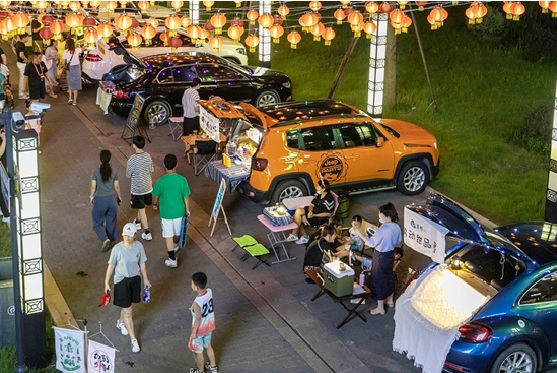By Xu Peiyu
Trunk market has gained popularity in many cities across China since the beginning of this fall. The lively atmosphere created by such markets stimulates citizens’ consumption desire, while adds a pleasant vibe to cities.
When the night closes in, trunks of private cars are turned into special mobile stalls filled with all kinds of petty commodities, attracting passing crowds.
In the Donghu Park in Zaozhuang city, east China’s Shandong province, people use their car trunks to sell hamburgers, bubble tea, and handicrafts.
During the week-long Chinese National Day Holiday in October, a trunk market featuring parent-child bonding was opened in the Grand Bao’en Temple in Nanjing city, east China’s Jiangsu province, attracting wide attention. Stallholders at the market were mostly parents and their children. The special trunk market provided children a special experience of selling things from a stall.
In Wulin Night Market, Hangzhou city, east China’s Zhejiang province, a pink car was covered with various eye-catching slogans and converted into a stall selling lemon tea. The car trunk-turned stall has become a Internet-famous site by virtue of the good taste of its drinks and its novelty look.
Fast food and drinks, such as coffee, hamburgers, and small cakes, are the most common commodities sold in many trunk markets in Beijing, followed by handicrafts, fridge magnets, and other kinds of petty commodities. Pet supplies, including snacks and clothes, are also often found in such markets.
“The organizer of the market has stipulated that there should be no open flame on the stalls, so the food sold here is mostly fast food,” said a stallholder at a trunk market, who disclosed that people who want to sell food at the market are required to provide relevant documents for the organizer, including a food business license.
Besides providing documents, stallholders also need to pay stall fees. The prices for trunk market stalls in different markets vary between 200 yuan ($27.64) per day and 500 yuan per day, and the payments are made either on a daily or monthly basis, according to credible sources.
Car trunk stallholders don’t get stable incomes from the sale of goods. A stallholder in Beijing told People’s Daily that trunk market can only be considered a way to earn an extra income.
A handmade coffee stall can sell 60 cups of coffee a day and bring an income of 1,200 yuan when it’s crowded, the stallholder said.
“But the business is rather unstable. You can sell 60 cups of coffee on a good day, and less than 10 cups on another day. And when the weather is bad, you couldn’t even go out to the market,” the stallholder added.
Many young stallholders say they join the trend out of interest, and noted that trunk market brings them satisfactory experiences of social contact.
“I don’t make money every time; but every time I set up the stall, I have new gains,” a young stallholder told People’s Daily.
“Every time I sell from my stall, I get to chat with nice passers-by. It feels great to meet new friends,” said a stallholder.
“I really enjoy hearing people tell me how good my coffee is,” another stallholder said.
People who enjoy visiting markets are likely to feel a stronger desire to buy in markets than in other occasions, according to a Beijing citizen surnamed Chen.
“When people see stuff that’s not expensive in the market, they tend to have a impulse to buy it. But when they see the same stuff on the Internet, they probably don’t place the order,” said Chen, who has bought from trunk markets fridge magnets sold at 10 yuan each, pet snacks priced at 35 yuan a bag, and various kinds of pour-over coffee, which was about 20 yuan a cup.














